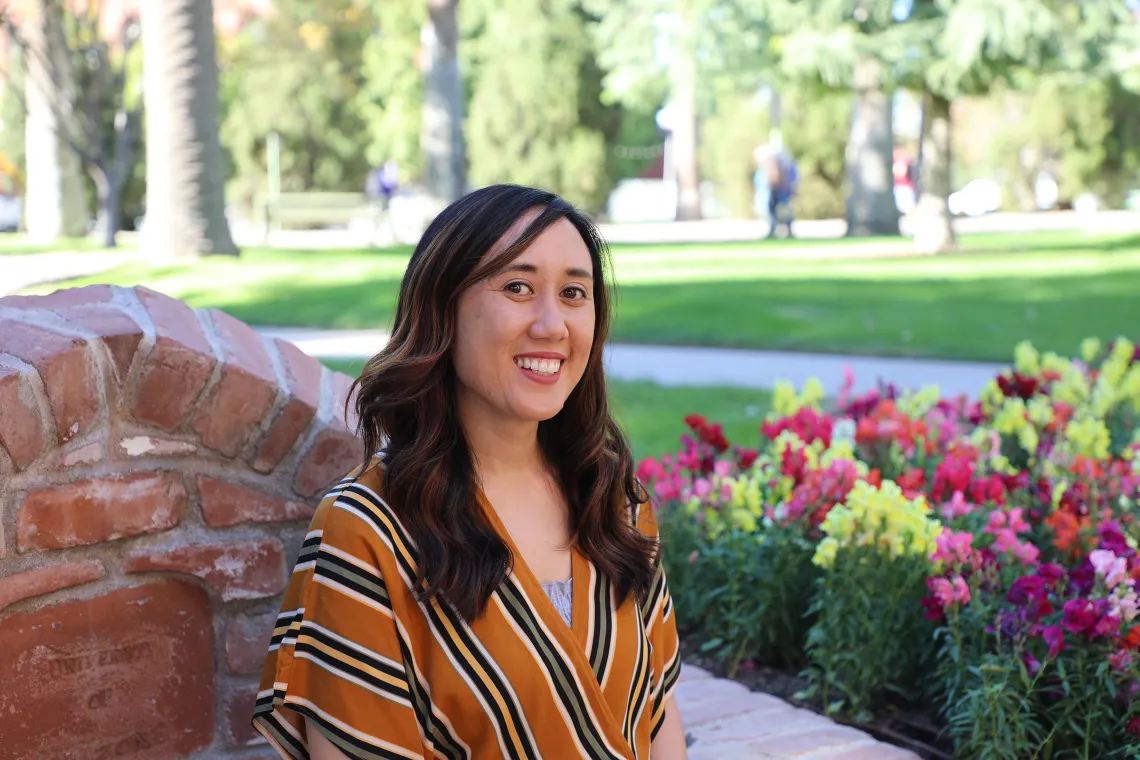Alum Maggie Melo On Combining Academic Interests To Create Your Future

Maggie Melo
Traditionally, students in doctorate programs get their degree in a field, and then apply for an academic job in that same field. But not Maggie Melo.
In 2018, Melo received her Ph.D. from the Rhetoric, Composition, and Teaching of English Program in the UA Department of English. She is now an assistant professor in the School of Information and Library Science at the University of North Carolina at Chapel Hill. It’s not an obvious leap.
Melo’s expertise is innovation, maker culture, and the development of equitable and inclusive collaborative learning spaces in academic libraries. She developed her specialty through her studies in the RCTE Program and her work at the UA Libraries. Melo helped develop the UA Libraries makerspace—the iSpace—and founded the Women Techmakers Tucson Hackathon.
The College of Social and Behavioral Sciences, which houses the Department of English, caught up with Melo when she was in Tucson to receive the 2018 Top Library Cat Award from the UA Libraries at its Homecoming Library Innovation Breakfast in October.
Tell us about the Rhetoric, Composition, and Teaching of English Program.
What’s so great about the Rhetoric Program is that it is so interdisciplinary. Rhetorical studies extends a lens to examine written and spoken language, but also how language shapes the way people behave in different social contexts. I study the rhetoric of innovation, specifically how innovation is conceptualized in higher education makerspaces and how popularized ides of innovation impact how research and learning takes place in academic libraries.
As we are teaching English now, it is not just alphanumeric, not just text. It is multimodal; we are creating podcasts, virtual reality environments, and 3D-printed artifacts. We are making things and composing in different ways. So one of the strengths of our Rhetoric Program is examining composition beyond traditional conceptualizations of writing. We are broadening our idea of what it means to teach English by thinking through and with different genres for diverse audiences.
Did you know when you are started the Ph.D. that you wanted to do research on libraries, innovation, and makerspaces?
No, that happened along the way. In the beginning, I thought I would be doing traditional research. But then Ken McAllister [associate dean of research and program innovation in the College of Humanities and former professor in the RCTE program] asked me if I wanted to help start the makerspace. I had just started and I said “absolutely.” Experiential learning has always been a value I held deeply as a student and teacher, and so I couldn’t pass up this opportunity.
The people in the RCTE Program were incredibly supportive of me and my interdisciplinary approach to research. It was encouraged and because of that, I was able to be a researcher not only in English but also in Library Science. In a very competitive job market, having an interdisciplinary profile was incredibly important. It was critical to my success.
They [UNC] brought me on because of where the field is headed. We are preparing the next generation of librarians to connect patrons with traditional resources such as books and articles, but also with newer resources such as 3D printers and virtual reality. In my capacity, I am teaching up-and-coming librarians how to connect users with their information needs, while also remaining critical of these resources and services.
How do you think the humanities and social sciences intersect with technology?
My approach to the humanities has always centered on the human experience. What does it mean to be human in this deeply digital and mediated world? I am interested in how technology impacts human behavior in tech-centric environments such as makerspaces.
It seems like many students do not want to be bound by traditional degrees; they want to combine their various interests. What is your advice for them?
Just this week, I had three students come into my office and ask me something similar. “I have all these different interests and I don’t want to commit to one,” they say. It’s a daunting decision – they don’t know which to do, so they don’t do anything.
If students are interested in many things, my suggestion is to take a moment to reflect. What big ideas do you consistently think about? Which communities do you want your research to participate within? What excites, infuriates, and or stimulates you intellectually? Once you have an idea, then go and talk to people across different disciplines and communities to gain a sense of how they are approaching their research. When possible, participate in interdisciplinary collaborations because it makes the research deeper and richer with many perspectives.
What advice do you have for students who are trying to map their careers?
Do things that may not seem like they will further your goal. I know this sounds counter-intuitive, even counter-productive. Say “yes” to opportunities that you think might not fit. That is how I ended up in the libraries. Initially, I thought my work in the libraries was just that, a job. Over time, I quickly realized how committed I was to connecting students, faculty, and the Tucson community to the resources and librarians at UA. Not only that, but I wanted to focus my research efforts to help make libraries more inclusive and welcoming to users. I found my community in the library. I realized that this is exactly where I want to be.
Fixating too much on traditional careers within your discipline is limiting. Only a small percentage of graduates land careers in their field of study, yet they find fulfilling careers in other fields. It’s cliché, but focus more on the process rather than the end product. Mapping out a career is a messy process, but if you go with your gut and find your community, it’ll all work out.
For more information on what Melo did with the UA Libraries, go to their “5 Questions with Maggie Melo ’18.”

